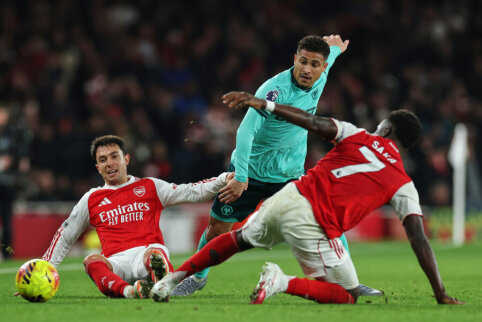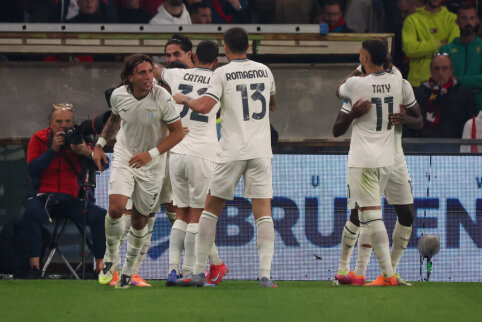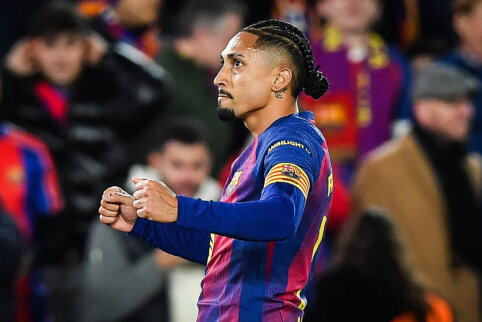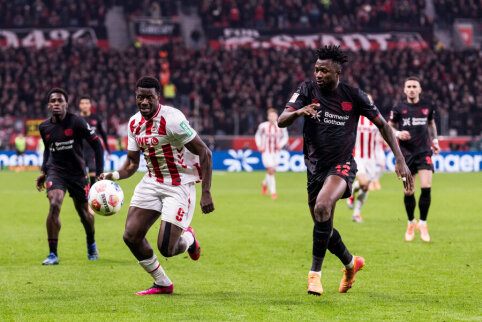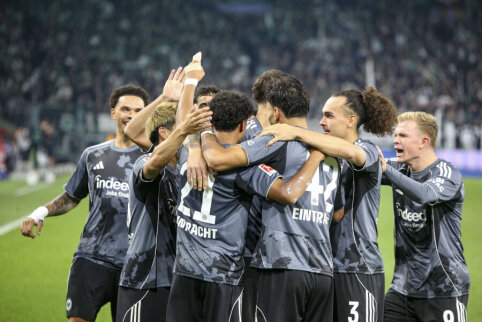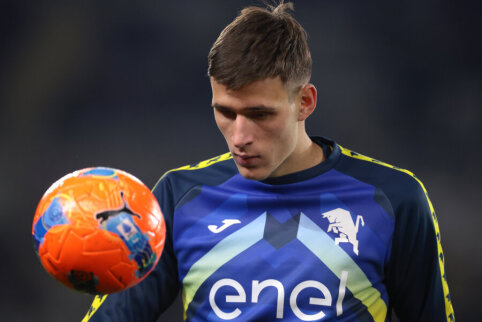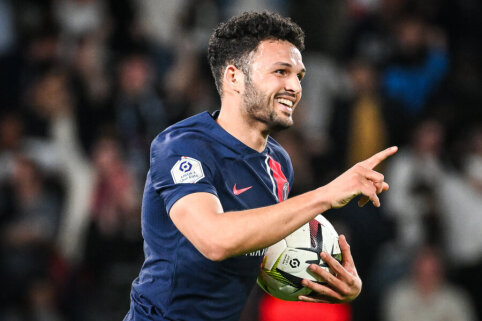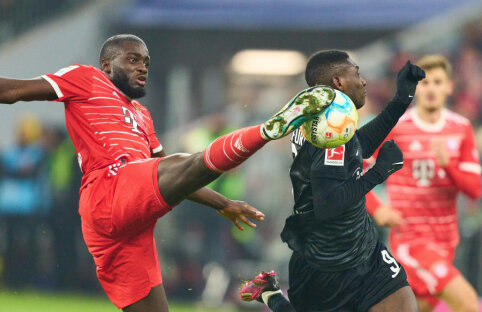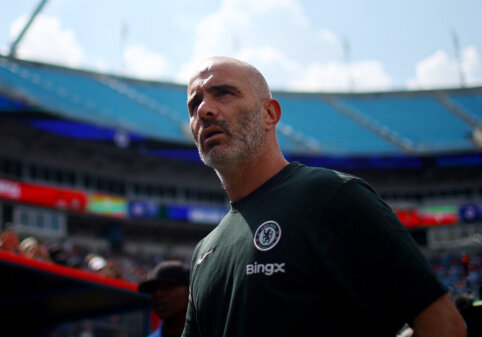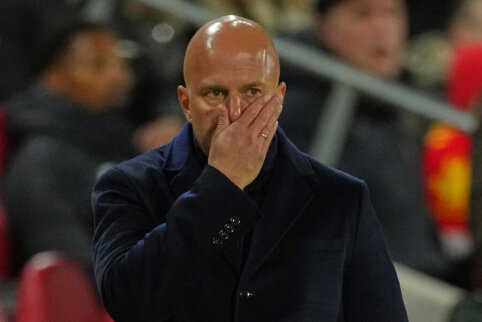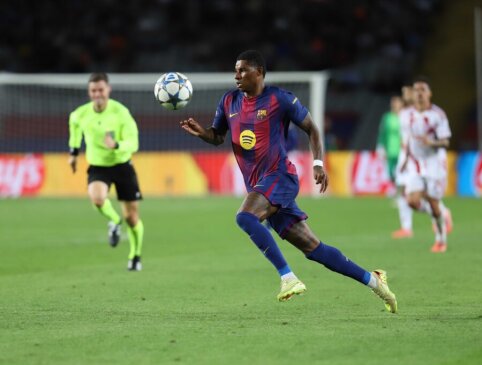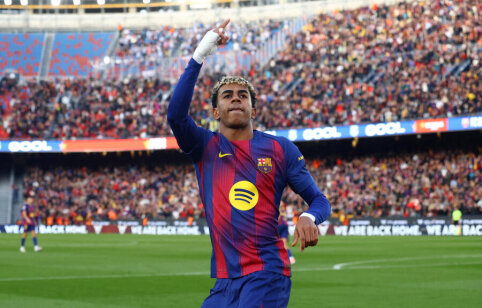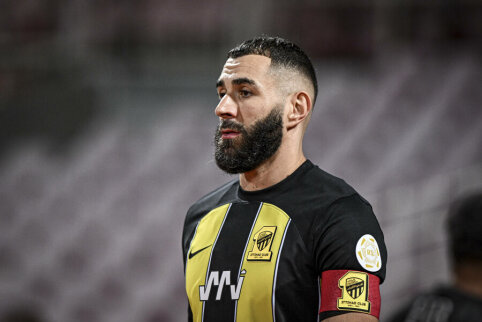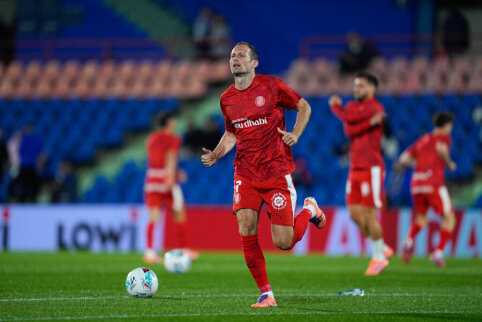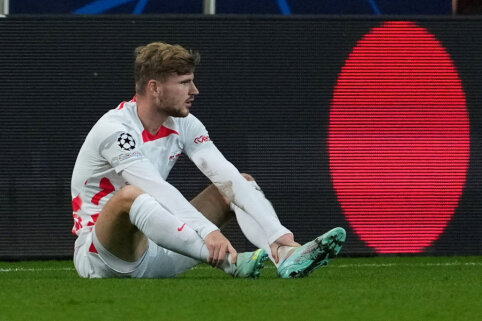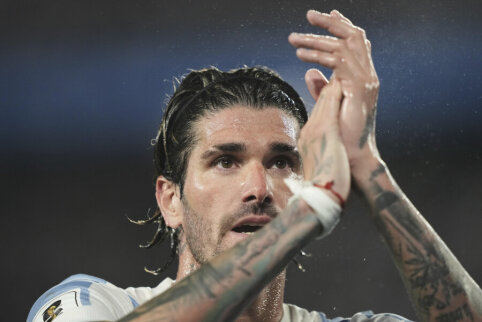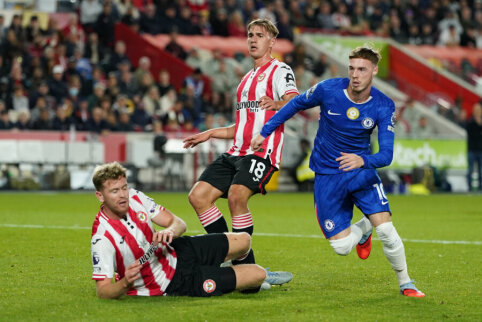 © EuroFootball.com
© EuroFootball.com
The principles of educating the growing generations of young footballers will now be aimed at improvement by applying a new football talent search and training program prepared based on the best examples of European countries and FIFA recommendations.
About this and the issues of children and youth education, on Thursday, at the headquarters of the Lithuanian Football Federation (LFF), LFF President Liutauras Varanavicius, Technical Department Director Stasys Stankus, and national team coach Raimondas Žutautas discussed with journalists.
It was concluded during the discussion that the country has a flawed system of children and youth training, resulting in losing talented footballers, decreasing the already small number of players, and even though the most talented teenagers are selected for the National Football Academy, they have to be re-taught the basics of football.
Error-prone player training system
L.Varanavicius admitted that he is not satisfied with this year's results of youth national teams and stated that the current situation is part of the overall sports system.
"Currently, six thousand children are in sports schools, about two thousand are in clubs. We have no influence on sports schools, which are subordinate to municipalities, working with children. They continue to operate in a Soviet system. The only thing that has changed since those times is that no one supervises the work of these schools, the quality of children's preparation is not evaluated, their level of mastery," said L. Varanavicius. "We believe that the training of young footballers should be inseparable from clubs. Clubs should train their own substitutes. This is foreseen in our strategy, and we expect that by implementing the post-training activity basket project, competition will emerge for sports schools, and the quality of children's preparation will only improve."
According to S. Stankus, children are trained in sports schools improperly, making it increasingly difficult to find talented footballers: "We have prepared and provided a lot of methodological materials on how to work with children of different age groups. We have analyzed training peculiarities, released publications on how to integrate football into football training sessions. We have proposed a competition system similar to that in Europe, where children play with a smaller ball, on smaller fields, and the youngest simply enjoy the game without emphasizing the result. However, state sports schools and their coaches are not interested in working according to this system."
R. Žutautas emphasized that the most important thing is not achieving results, but the massiveness of children and mastery education: "Now there is competition in sports schools for results - who is stronger. However, this should not happen at the expense of the little ones. When only half of the 6-9-year-old children in a group get to play, the rest get disappointed and quit training, and we lose potential talents."
"For example, I myself only blossomed at the age of 19. Abroad, results at the children's level are not even counted, there are no tournament tables. Some play five minutes, others play the remaining five, and everyone gets a chance to touch the ball," said the national team strategist.
New program for talent search
To improve the situation in the young players' training system, LFF has created a football talent search and training program. Greater attention will be paid to the country's regions, developing individual talented athletes' abilities at an early age, and increasing the qualification of their coaches.
Every year, the most talented footballers in the country will be selected through selections held in the regions - football specialists will observe and evaluate the playing and individual abilities of young people, selected footballers will be given an individual training program and monitored on how they improve. The best coaches will be offered not only qualification enhancement but also an additional financial motivation system.
The most talented and developed athletes will be invited to the National Football Academy.
In preparing this program, consultations were held with various specialists, analyzing the best practices in children and youth training in other European countries. This week, at the FIFA "Goal" committee, funding was approved for four years.
"The funding is not large, but we hope that it will help improve the situation at least until post-training activity baskets appear, and youth education transitions into the hands of private clubs," said L. Varanavicius.
For the national teams - limited player selection
Speaking about the unsuccessful results of Lithuanian youth national teams, overseen by S. Stankus, he said that team coaches can choose from a very small number of players.
"For example, this year there was a U-17 selection tournament. In Lithuania, we have 400 sixteen-year-olds playing football. In Belgium, there are 34,000. Spain has such a huge selection of players that the composition of the current U-19 national team two years ago was completely different at the U-17 level. From a larger mass of players, it is possible to find more talents. We don't have enough talented players to form a team solely from players born in 1992 or 1994, so we have to rely on younger ones," said the LFF Technical Department Director.
The national team strategist R. Žutautas pointed out that the goal of youth national teams is not to achieve the highest places but to prepare players for the national team: "I recently watched a U-19 selection tournament. The results were not good, but what matters is that in that team, I saw at least five players who could complement the national team after a few years."
Finding mistakes in the academy
S. Stankus emphasized that the National Football Academy, which has been training players for only three years, cannot yet produce tangible results because a player's development takes much longer, and previous mistakes have to be corrected.
""Up to the age of 12, future players should learn the basics of football, from 12 to 15, the improvement process takes place, from 15-18, mastery is developed. If coaches make mistakes at the early stages, it affects the players in the later stages. The academy receives players without basic football skills and has to waste time on the fundamentals, instead of improving their skills and preparing them for adult football," said the head of the LFF Technical Department.
However, three years of work have already yielded the first results. The game of graduates of the National Football Academy is constantly monitored in national teams, they receive invitations to strong foreign clubs. "We have been working with players born in 1993 since the academy was established. The results are already visible - two players have signed contracts with Italian clubs, one with English clubs. Others are constantly going to trials and camps. Of course, there have been mistakes in the academy over the past three years, but we learn from them," said S. Stankus.
Strategy - more youth teams and coaches
One of the priorities of Lithuania's football strategy for 2010-2020 is the development of players in clubs and club teams. It is aimed that clubs should have 15 teams, including 10 youth teams. According to the head of the LFF, this goal is being gradually achieved through licensing requirements.
"Five years ago, the criteria for club youth teams were desirable, this year we already demand five teams, next year six will be mandatory. Some clubs already meet this requirement, but some do so reluctantly or try to use the already existing teams in football schools. Nevertheless, we hope that Lithuanian clubs will understand the importance of substitution training and switch to the European model. Moreover, the economic situation forces us to prepare our substitutes and not limit ourselves to buying players, as was customary before," said L. Varanavicius.
The long-term football strategy also focuses on the training of children's football coaches. It aims to provide coaching C licenses to physical education teachers working in schools.
"In the first year, we expect to train about 40 C-license coaches. In the following years, we will have six instructors who will train at least 20 coaches each year in the regions. We hope that some of these will advance to B licenses, and later, with the emergence of post-training activity baskets, they will be able to find work in clubs. Unfortunately, we currently have only 220 qualified football coaches. For comparison, Scotland has almost a hundred times more," said L. Varanavicius.
